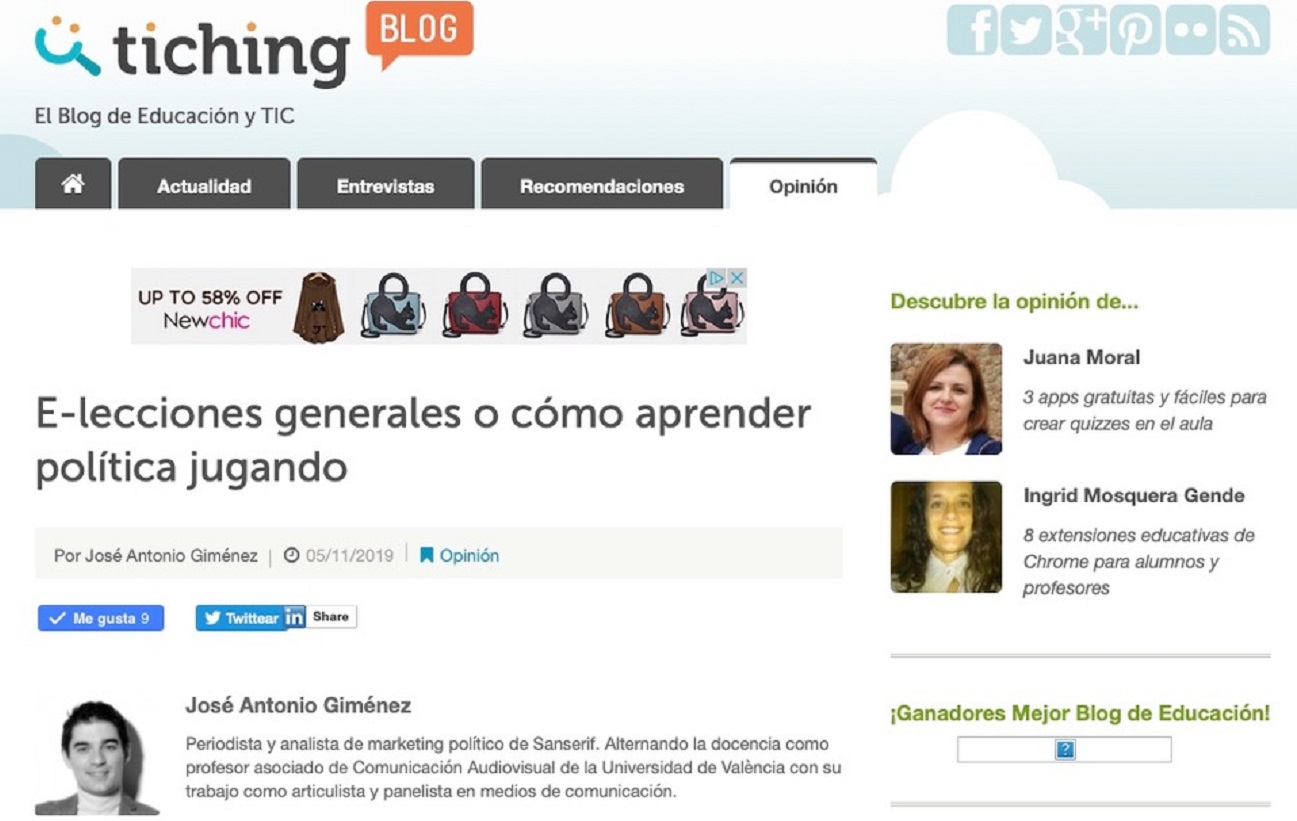
05 Nov e-lecciones generales or how to learn about politics by playing
 Source: Tiching
Source: Tiching
Who said that politics could not be fun? Politics is a strategy game in which territories are conquered, seats are stolen, you are challenged to debate or even forge alliances (pacts) to obtain absolute or simple majority in order the winner to rule over a territory.
And, however, it is true that little or very little we know about how an electoral process and campaign work. Not even how our votes are counted, or why some votes carry more weight in some regions than in others.
All this which a priori seems to be cumbersome, can be easily learnt by playing the role of a politician or a campaign advisor, interacting with your friends, sitting face to face in front of a board game and some cards. This is what is called gamification, that is to say, the use of game mechanics in non playful environments in order to promote concentration, and other positive values related to games.
And, moreover, in an electoral campaign there are a lot of terms used which are part of the curriculum in Primary and Secondary school subjects, such as environmental studies- maps, state structure…-, or basic curricular competences like the competence of linguistic communication, learn how to learn or the sense of initiative and entrepreneur spirit.
In fact, generally speaking, learning gamification has positive consequences that go beyond knowledge revision or acquisition:
- *Board or cooperative games create a classic scenario to the decision making and troubleshooting.
- *Players learn how to work together and reach consensual decisions, all these with a high level of motivation.
- *Players learn how to convey their emotions in relation to others, working on emotional intelligence and also on respect and integration.
- *They naturally improve attention and motivation too, which helps to the capacity of learning and reinforcing the prior learning.
- *They encourage the engagement and active participation of students in their learning process, due to the fact that they have to face situations which totally depend on their decisions.
For this reason, inspired by the work of the teachers who promote “educating while playing”, we decided to launch a crow funding campaign to edit and distribute a board game “e-lecciones generals” which teaches electoral campaigns’ mechanisms and the distribution of seats in the Congress of Deputies. This is non-profit game, with the purpose of educating in a fun way about essential aspects in the integration and participation of citizens in society.
It should not be forgotten that politics are important because the organization system of human societies is also the process of making decisions that apply to all the members of society. The aim of this project “e-lecciones generals” is to provide society in general, but, particularly, Primary and Secondary students, with the basic knowledge in the process and electoral mechanics.
In this sense, this board game has been designed as a playful way to transfer the essential information to understand how electoral campaigns are held, what mechanism are used to draw people’s attention and votes, as well as approaching concepts such as debate, day of reflection, scrutiny, commission of inquiry, or the necessity of post-electoral pacts to reach a qualified majority. It also requires dialectic capacity, strategic thinking and basic calculation knowledge.
At its core, we want students to realise that first-hand politics can be passionate and fun, but also that voting is a responsibility which we do not leave in others’ hands, encouraging critical thinking, through a board game which realistically reflects the main political options – without names, but with colours – and leaves the planning of the programme and the way of facing the electoral campaign to the players.
We understand that, if every fan has in its heart a national coach, due to the fact that lately there are more elections than international competitions, every citizen has to leave a piece of his heart to a political strategist.
Politics must have a greater presence in citizens’ lives – and also in schools-, and a good way to do it is to transform it into a role-playing game, in which students come face to face, using dialectics and the previously acquired knowledge.
*****
José José Antonio Giménez
Sanserif.es

